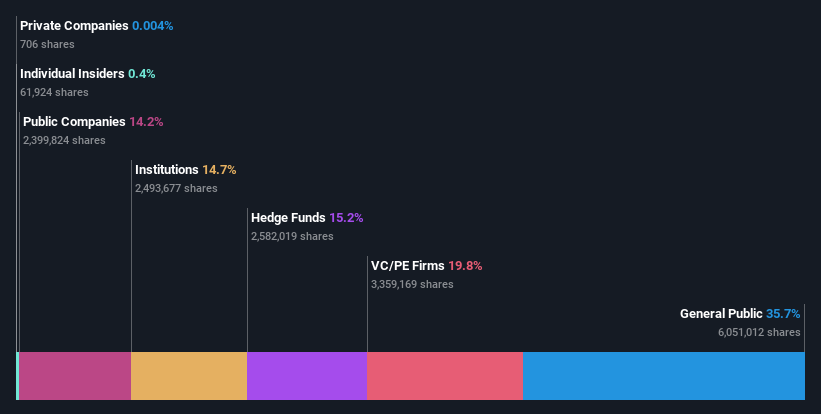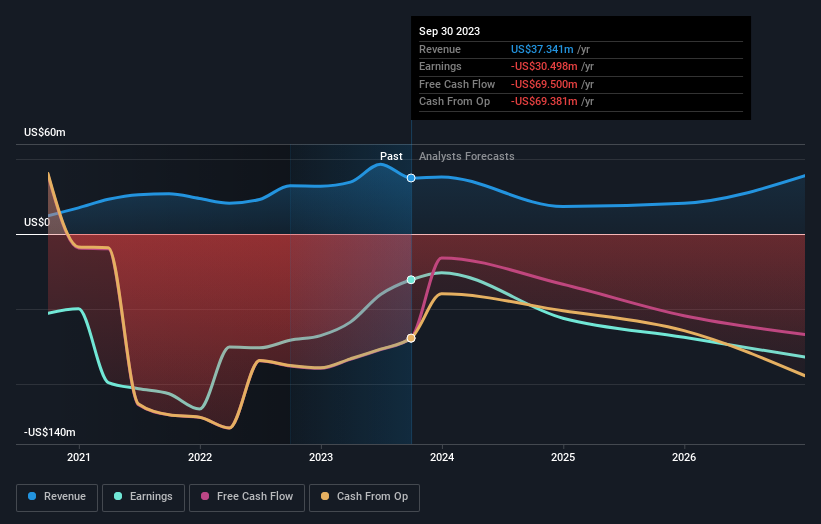While private equity firms own 20% of Harpoon Therapeutics, Inc. (NASDAQ:HARP), retail investors are its largest shareholders with 36% ownership
Key Insights
Significant control over Harpoon Therapeutics by retail investors implies that the general public has more power to influence management and governance-related decisions
The top 6 shareholders own 53% of the company
To get a sense of who is truly in control of Harpoon Therapeutics, Inc. (NASDAQ:HARP), it is important to understand the ownership structure of the business. And the group that holds the biggest piece of the pie are retail investors with 36% ownership. Put another way, the group faces the maximum upside potential (or downside risk).
Private equity firms, on the other hand, account for 20% of the company's stockholders.
In the chart below, we zoom in on the different ownership groups of Harpoon Therapeutics.
View our latest analysis for Harpoon Therapeutics
What Does The Institutional Ownership Tell Us About Harpoon Therapeutics?
Institutions typically measure themselves against a benchmark when reporting to their own investors, so they often become more enthusiastic about a stock once it's included in a major index. We would expect most companies to have some institutions on the register, especially if they are growing.
Harpoon Therapeutics already has institutions on the share registry. Indeed, they own a respectable stake in the company. This suggests some credibility amongst professional investors. But we can't rely on that fact alone since institutions make bad investments sometimes, just like everyone does. If multiple institutions change their view on a stock at the same time, you could see the share price drop fast. It's therefore worth looking at Harpoon Therapeutics' earnings history below. Of course, the future is what really matters.
It looks like hedge funds own 15% of Harpoon Therapeutics shares. That's interesting, because hedge funds can be quite active and activist. Many look for medium term catalysts that will drive the share price higher. The company's largest shareholder is Merck & Co., Inc., with ownership of 14%. In comparison, the second and third largest shareholders hold about 11% and 9.2% of the stock.
We also observed that the top 6 shareholders account for more than half of the share register, with a few smaller shareholders to balance the interests of the larger ones to a certain extent.
While it makes sense to study institutional ownership data for a company, it also makes sense to study analyst sentiments to know which way the wind is blowing. There are plenty of analysts covering the stock, so it might be worth seeing what they are forecasting, too.
Insider Ownership Of Harpoon Therapeutics
The definition of company insiders can be subjective and does vary between jurisdictions. Our data reflects individual insiders, capturing board members at the very least. Company management run the business, but the CEO will answer to the board, even if he or she is a member of it.
Most consider insider ownership a positive because it can indicate the board is well aligned with other shareholders. However, on some occasions too much power is concentrated within this group.
Our most recent data indicates that insiders own less than 1% of Harpoon Therapeutics, Inc.. It appears that the board holds about US$1.4m worth of stock. This compares to a market capitalization of US$380m. Many investors in smaller companies prefer to see the board more heavily invested. You can click here to see if those insiders have been buying or selling.
General Public Ownership
The general public-- including retail investors -- own 36% stake in the company, and hence can't easily be ignored. While this group can't necessarily call the shots, it can certainly have a real influence on how the company is run.
Private Equity Ownership
Private equity firms hold a 20% stake in Harpoon Therapeutics. This suggests they can be influential in key policy decisions. Some investors might be encouraged by this, since private equity are sometimes able to encourage strategies that help the market see the value in the company. Alternatively, those holders might be exiting the investment after taking it public.
Public Company Ownership
We can see that public companies hold 14% of the Harpoon Therapeutics shares on issue. We can't be certain but it is quite possible this is a strategic stake. The businesses may be similar, or work together.
Next Steps:
I find it very interesting to look at who exactly owns a company. But to truly gain insight, we need to consider other information, too. Take risks for example - Harpoon Therapeutics has 3 warning signs (and 2 which are concerning) we think you should know about.
Ultimately the future is most important. You can access this free report on analyst forecasts for the company.
NB: Figures in this article are calculated using data from the last twelve months, which refer to the 12-month period ending on the last date of the month the financial statement is dated. This may not be consistent with full year annual report figures.
Have feedback on this article? Concerned about the content? Get in touch with us directly. Alternatively, email editorial-team (at) simplywallst.com.
This article by Simply Wall St is general in nature. We provide commentary based on historical data and analyst forecasts only using an unbiased methodology and our articles are not intended to be financial advice. It does not constitute a recommendation to buy or sell any stock, and does not take account of your objectives, or your financial situation. We aim to bring you long-term focused analysis driven by fundamental data. Note that our analysis may not factor in the latest price-sensitive company announcements or qualitative material. Simply Wall St has no position in any stocks mentioned.


